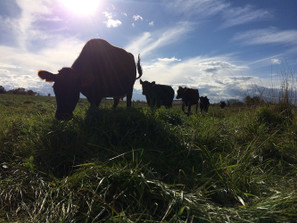Posted by Jack McCann on Mar 13th 2024
USDA Organic vs TC Farms Approach
USDA Organic
I was asked once if I would choose a store's generic 'grass fed' beef or the feedlot 'organic' beef. Honestly, I struggled with this choice and didn't know how to respond.
USDA Organic guidelines require all feed or land accessed is organic, no medications or growth drugs, and "access" to the outdoors.
Let's break this down:
- 'Access' to the outdoors is meaningless (see Pasture Raised)
- Organic feed doesn't mean balanced diet for the animal
- Even if needed, medications are not allowed
I am pretty opposed to antibiotic use and don't take them even if I have pneumonia. However, if my kids had pink eye and were at risk of losing an eye or another dangerous infection, I'd choose a treatment of antibiotics over the loss of a limb or worse.
The animals under our care rarely get sick or injured, but we'd help them with the same type of careful care we'd provide our kids. The problem with medication is its abuse and overuse, not the warranted use.
The all or nothing approach of USDA organic means farmers ship off sick animals for processing. I don't want animals to suffer and I don't want to eat meat from sick animals either.
Example
Just because something is organic doesn't mean it is GOOD for you to eat. What if you ate organic sugar all day long?
The same is true for animals. An organic corn/soy ration just isn't healthy for pigs. One of our farms has also raised sets of pigs fed the normal corn/soy ration, but who otherwise are identical to TC Farm's no-soy/low corn pigs. The corn/soy pigs digestive system was a mess, the manure was rank and the difference was so dramatic the farmer was shocked to learn that was 'normal'.
Corn/soy fed pigs save about $0.50 - $1 per pound, but the animals are clearly not as healthy. It doesn't matter if the corn/soy is organic, it still isn't healthy for the pigs.
TC Farm's Approach to Organic
A lot of small farms say they aren't organic because they don't want to spend the extra money on certification. I always bristle when I hear this because the cost of certifying organic is really quite small. What they are really saying is they don't want to follow the organic standards and aren't comfortable being transparent on why.
At TC Farm we don't certify our meat organic because we disagree with two of the organic requirements.
We follow almost all the organic standards, but also insist that animal welfare be a top priority. In the rare case a specific individual animal needs medical attention, we take care of them and never market a sick animal.
We also encourage the use of transition organic grains. This supports Minnesota farmers who are switching to organic production. They raise the crops 100% following the organic standards, but it takes three years of this to certify their grains as organic. We help support them by purchasing these transition crops at a premium. Most of our feed is certified or certifiable organic, but we still want to support those making our local environment better by switching to organic production.
These are the only two issues preventing us from certifying our meat organic. The cost would be about 1-2% of the retail sales, so for us the issue is more that the USDA organic system requires some things we simply don't agree with.


